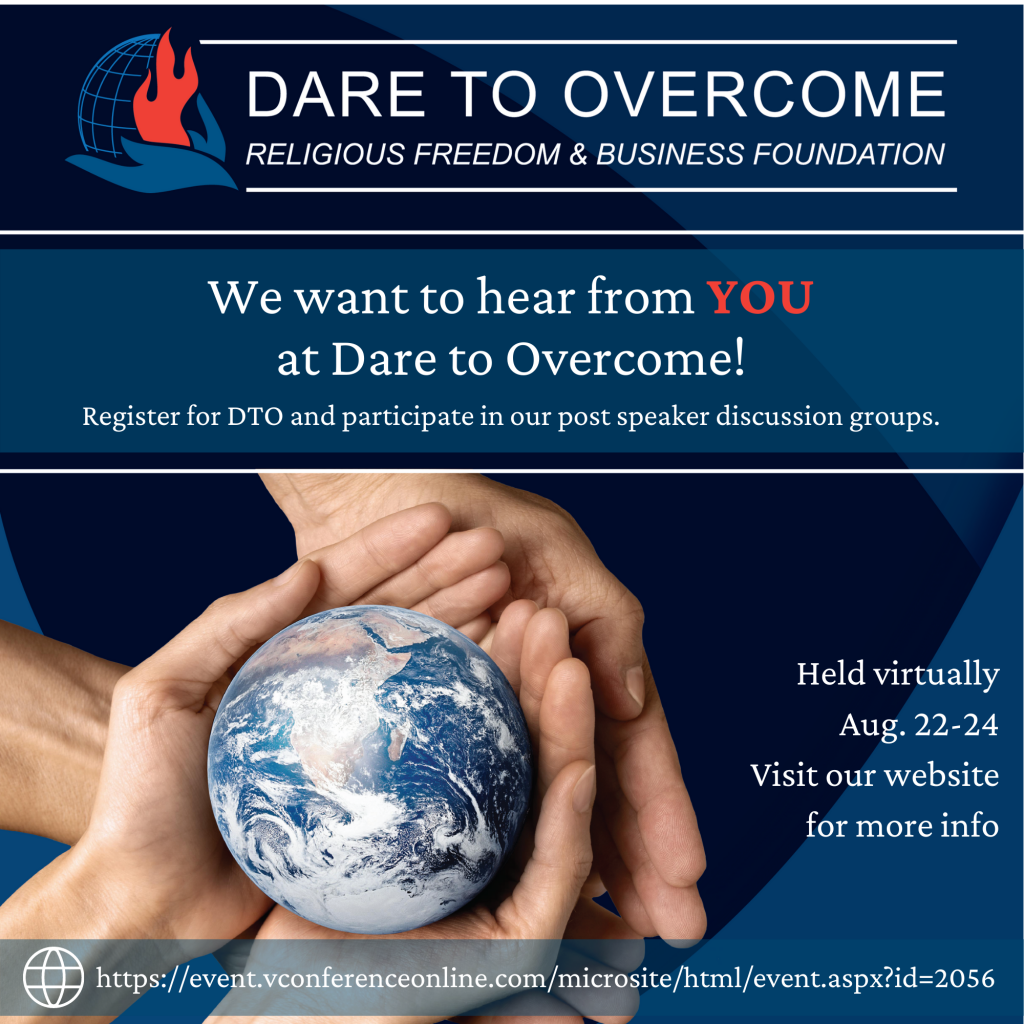by Kent Johnson, J.D., Senior Corporate Advisor, Religious Freedom & Business Foundation
Part of the blog series, Authenticity & Connection
Today, in many circles, certain words and phrases are instantly presumed to signify that the speaker has bad character and dangerous intent, and is worthy of mockery, condemnation and aggressive opposition. Presumed association with a group or worldview is enough to spark distrust, fear and hatred; and in extreme cases even promotes violence.
You’ve seen it on social media, and, chances are, even in your workplace. You yourself may have fed the drama.
Against this volatile cultural backdrop, how can we begin to weave a fabric of civility?
There’s hope. We at the Religious Freedom & Business Foundation have seen how Businesses can launch transformative ventures of civility across cultures, by embracing Covenantal Pluralism.
Let me begin by providing two controversial examples from workplaces: one individual’s perception of the study of “intersectionality and critical race theory,” and another’s perception of the promotion of “religious freedom.” (Warning: I’m going to wildly oversimplify controversial issues here – and I don’t intend to “take sides” on any of the controversies – but if you’ll bear with me, I think you’ll see the overall goal of this analysis is helpful and apt).
First, “Intersectionality.” Ann (a fictitious name) sees the growing focus on intersectionality and critical race theory in diversity training as a means by which socialists are fueling anger and resentment among aggrieved parties in order to influence legislators to force an unfair and counterproductive governmental redistribution of wealth. More troubling than that, she worries that certain coworkers are pushing for a Marxist revolution and establishment of an all-powerful central government that will crush people like her. This impacts her work, because, in the course of the diversity training, Ann feels she’s been accused of having racial bias, simply by virtue of her race. She worries that this will impede her advancement in the company.
Second, “Religious Freedom.” Bob (a fictitious name) sees the phrase “religious freedom” as a pretense by which fundamentalists are trying to deny HIS freedoms, and to condemn him. The CEO of the company he works for says the business is run according to “Biblical principles,” and openly supports legislation to advance “religious freedom.” Bob says, “Why should fundamentalists be allowed to cram their restrictions and condemnation down our throats?” He worries that his employer seeks to impose a theocracy that deplores the core values and beliefs of people like him. He feels alienated, powerless and fearful.
Two different topics. In each case, the perceived threat is both personal and corporate. It seems each is promoting laws and policies that would protect its interest by imposing restrictions on the other. It’s adversarial. One side’s success would spell the other’s failure. The fears are real; and they greatly complicate relationships at work.
Time for disclaimers. What I have to suggest is no panacea. I’m not contending that protective laws and policies are unnecessary. I won’t resolve the complex issues associated with these topics. But I’ll suggest a step toward strengthening the fabric of civility in your workplace, person by person.
I believe that though it’s important to understand the past, historical conflicts need not prevent us from creating something new and better. Through one-on-one engagement that remains true to the core values of each person, we can nurture a culture that respects differences without trying to compel uniformity of core beliefs.
Intersectionality and religious freedom are just two of many possible examples, but by way of illustration, let’s push ourselves to think anew about the goals and the potential impact of each. We can do this by opening the door to employees’ respectful discussion of core values and beliefs. (Not compelling such discussion; but encouraging it). Returning to our two examples:
Ann chose to engage with the colleague who said she was a bigot; to give that person the benefit of doubt concerning intent. Over time, Ann and her colleague began to perceive another facet of “intersectionality” in a generic sense. They discovered that they share a belief in God, and they both aspire to treat others the way they themselves would like to be treated. They learned that each has a family member (by blood or marriage), whom they love, who ascribes to the views of the other on intersectionality; and some who belong to the same organizations. Their common interest in caring about their family members with different views brought them together. Today the two are close friends, working in concert.
What about Bob? In light of negative experiences with religious people from whom he sensed condemnation, he was unwilling to engage with the advocate of religious freedom. But a trusted colleague told him about a panel discussion at his company among people of various faiths, and an atheist, about how the speakers’ faith and belief systems affected their work. He attended. To his surprise, he witnessed genuine respect and warmth among these diverse speakers. Each remained true to his or her belief system; yet they really seemed to respect and care for one another. He was encouraged by what he saw; and today he’s a strong advocate of reaching out to “the other side.” Talk with him today, and you’ll come away filled with hope for civility.
Multiply these personal interactions by the thousands, and you’ll begin to see how workplaces that enable and encourage discussion of core values and beliefs are serving as platforms for civility to grow. Tremendous solid progress is made, one-on-one. But it doesn’t stop there: As each person engages on a deeper level with another representing a different perspective, the positive ripple effect spreads 360 degrees, as other colleagues witness reconciliation.
This doesn’t just happen spontaneously. But it’s possible. And it’s happening in more and more companies. A key starting point is to reach broad agreement on a set of basic ground-rules on which, in our experience, almost everyone will agree. For more on that, see our list of Basic Principles and our forthcoming article on Covenantal Pluralism.*
To learn more about the encouraging cultural transformations sweeping many companies, and to see how these themes of positive intersectionality and freedom of religion and belief work together, join us August 24 for the DARE TO OVERCOME conference. Register HERE.
* Author’s Accepted Manuscript. Forthcoming as, Brian Grim and Kent Johnson, “Corporate Religious Diversity, Equity, and Inclusion as Covenantal Pluralism.” In Chris Seiple and Dennis R. Hoover, eds., The Routledge Handbook of Religious Literacy, Pluralism, and Global Engagement (Oxford: Routledge, 2022).


